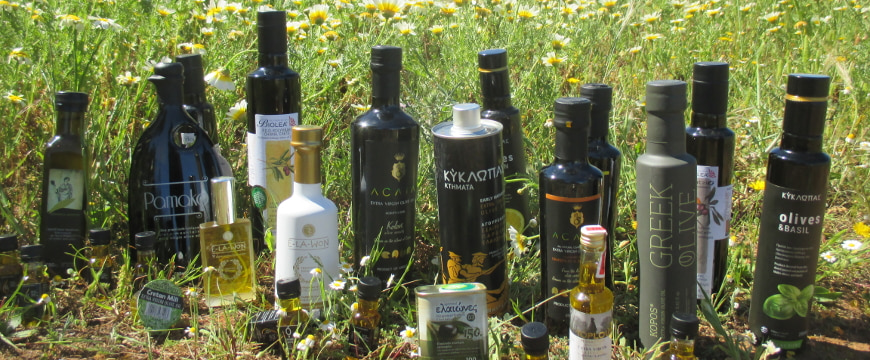When you think of olive oil, do you think of Italy and Spain? Did you know Greece produces the third largest quantity of olive oil on earth and the largest proportion of extra virgin, while consuming by far the most olive oil per capita? With this in mind, we asked some Greeks what they say to those who believe the best olive oil comes from Italy or Spain.
Greeks in the olive oil world mention quality, variety, production methods, and promotion. Olea Groves’ Ritsi Frances is most concise: “Just try the Greek one!” Laconiko’s Diamantis Pierrakos adds that “any individual that we have run across quickly changes their mind once they see our accomplishments and taste our olive oil.”
Pierrakos also points out that “there are many individual producers that produce great olive oil in the world, with each offering unique varietals.” There are hundreds of olive varieties, and each variety gives us a somewhat different oil. This means a wide range of olive oil flavors with different optimal food pairings – like wines.
For this reason, PJ Kabos’s James Panagiotopoulos tells Greek Liquid Gold he prefers to use the term “best” subjectively: "The ‘best olive oil’ for each consumer really does come down to personal preference of olive variety, intensity, etc." Why not try them all—or as many as you can?
Even a single variety, such as the Koroneiki common in Greece, can produce many alternatives: spicier extra virgin olive oils (EVOOs), fruitier oils, oils extracted from green olives that were harvested early, others from ripe black olives, some produced from irrigated olives, others not. Many diverse cultivation, production, filtration, and storage techniques affect the oil’s flavor, aroma, and health benefits.
Those techniques are critical. ALSEA-Sigounas Olive Mill’s Vasiliki Maraveli suggests “there are no good or bad olive oil producing countries; there are good and bad producers everywhere. Of course the Greek terroir is unique and can give excellent products, as long as we take advantage of it” with “proper cultivation and milling.”
There are different opinions about which methods work best, but many agree that careful treatment of the olives and oil is more important than national origin. According to Ellie Tragakes of Hellenic Agricultural Enterprises, “all countries in the world with climatic and soil conditions conducive to olive production can produce the best olive oil provided they use the best production techniques.” Increasing numbers of Greek producers are striving to do just that.
Still, Tragakes is concerned that “the abundance of Italian and Spanish oils in markets around the world, alongside the relative paucity of Greek oils,” has left too many ignorant of the quality of Greek EVOOs. “In fact,” continues Tragakes, “we have found that in Japan even some professionals are unaware that Greece produces any olive oil at all.” Fortunately, this “has begun to change as consumers around the world become increasingly familiar with Greek oils, as well as with oils from other oil producing countries.”
Stalia’s Katerina Bougatsou admires both the quality of Italy and Spain’s olive oil and those countries’ successful promotional efforts, which have made their oil “widely known.” She believes “Greek olive oil is traditionally excellent and one of the best in quality,” but it has been used within Greece more than it was promoted in other countries. She is glad that “new producers, including us, are now investing in the promotion of Greek olive oil abroad, and as a result it is increasingly recognized internationally.”
This promotion both highlights the award-winning quality of Greek EVOOs and emphasizes their health benefits. Kostas Kidonakis believes Greek olive oil generally “contains more polyphenols than extra virgin oils of Italy or Spain,” as well as tending to be fresh, with low acidity. E-La-Won’s Ioannis Kampouris mentions that many international scientific trials use especially healthy Greek extra virgin olive oils like his in studies of the prevention and treatment of diseases such as Alzheimer's and multiple sclerosis.
Kampouris adds that 80% of Greek olive oil is extra virgin—a far higher percentage of this highest quality oil than we find in Spain and Italy. That helps explain why an international fan base appreciates it. For example, a Japanese woman living in Greece reports that her family and friends’ most pressing request is that she bring them Greek olive oil when she goes back to Japan.
Italian olive oil producer Adele Giaconia of award winning Villa Colonna says she likes Greek olive oil very much, considering it a bit bitter and spicy, “like Sicilian oil.” Gabriel Malet, a chef at the Spanish Embassy in Athens who cooks with olive oils from different countries, tells Greek Liquid Gold he loves Greek olive oils “from Crete, Kalamata, everywhere. I think Greek olive oils are fantastic; I really enjoy them.”
Join Greek cooks, Japanese consumers, Italian olive oil producers, and Spanish chefs in adding high quality, healthy Greek extra virgin olive oils to your kitchen’s collection! Why treat yourself to a variety of wines, but just one olive oil? Today’s marketplace offers a wealth of wonderful extra virgin olive oils. Sample many, and select your favorites.
_________________________
Thanks to the organizers of the Athena International Olive Oil Competition for the invitation to the tasting day and awards ceremony where the introductory photo was taken, and I was able to meet the international visitors mentioned near the end of this article.



